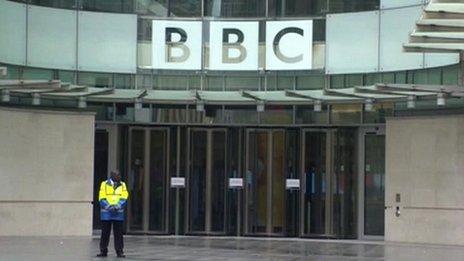At a glance - BBC annual report 2011-12
- Published

<bold>The BBC's annual report has been published for the financial year 2011-12. </bold>
Here are some of the key points from the review, which is conducted by the management and the corporation's regulatory body, the BBC Trust.
The BBC generated £499m in efficiency savings, bringing the cumulative total saved since 2008-09 to £1.498m.
Star salaries
The BBC has reduced its overall spend on artists, presenters and performers by £9.5m to £203m, covering 51,991 people.
The total paid to stars earning more than £1m was £9.69m - down from £14.65m the year before - while 16 stars earned more than £500,000.
Management pay
The BBC says it has made "significant progress" in reducing the number of senior managers and their salaries - with 70 posts cut in the last 12 months.
Pay for those earning more than £150,000 is down by 19%, while new senior managers are earning on average 10% less than their predecessors.
Director general Mark Thompson's base salary remained the same, at £613,000, but with no additional remuneration for pension benefits, his overall salary dropped from £779,000 to £622,000.
The total pay for the Executive Board - the BBC's very top management team - fell from £5.71m to £2.56m. However, the reduction was mainly due to six of the 13 members either leaving the organisation or stepping down from the board.
In terms of overall BBC staff, headcount was reduced by 384 from 17,242 to 16,858. The BBC said this reflected "the initial impact" of its Delivering Quality First savings plan.
Television
<bold>Managment's view:</bold>
The BBC continues to deliver value for money with the average cost per user hour at 6.4p, down from 6.6p the previous year and 7.0p in 2009-10.
More than 140 hours of new British drama were broadcast over the year - such as Call the Midwife and The Hour - as well as other new content including Frozen Planet and Mrs Brown's Boys.
<bold>The Trust's response:</bold>
The BBC should use the security of its licence fee funding to take creative risks that a commercial broadcaster might never consider.
BBC One must offer its viewers more in terms of fresh and new ideas. The Trust supported BBC management's ambition for the channel to be more topical and to ensure serious current affairs has a peak-time home.
BBC Two is succeeding in becoming more distinctive, with the return of original drama to the channel and a wide range of factual programming.
BBC Three and Four had a strong year, increasing viewership amongst their target audiences. Following last year's suggestion to increase BBC Four's impact, the Trust was pleased to find viewers were more familiar with the channel and its role.
Radio
<bold>Management's view:</bold>
Approval levels for BBC Radio has been the highest ever, while digital audiences also grew.
Downloads for radio programmes also surpassed the billion mark.
<bold>The Trust's response:</bold>
BBC digital stations all increased their audience last year, with 29% of all BBC radio listening now via digital platforms.
Radio 1 needs to continue focusing on serving its target audience of 15-29 year olds and expects to see a shift in the balance towards younger listeners with its recent schedule changes.
The Trust was pleased Radio 2 had made progress on the recommendation it became more distinctive during the day, while Radio 3 faced the challenge of becoming accessible to new listeners, while maintaining its distinctive range of music.
Radio 4 reversed the decline in listening amongst 35-54 year olds, which is considered important to the long-term health of the station. Radio 4 Extra became the most listened-to BBC digital station.
Radio 5 live must increase its focus on news and ensure a range of sport gets coverage alongside football.
Asian Network must preserve its distinctiveness and improve quality while reaching new listeners and reducing costs.
BBC Online
<bold>Management's view:</bold>
BBC Online reached a record 43m average weekly unique users in February this year, while BBC iPlayer programme requests reached 191.7m the same month.
BBC content is now available on more devices through partnerships with providers including Virgin, Xbox and Apple to extend its reach further.
<bold>The Trust's view:</bold>
People are accessing BBC Online on more devices with more than a quarter of usage now via mobile phones and tablets.
The Trust will examine the service and its perceptions of quality when it conducts its review later in 2012.
News
<bold>Management's view:</bold>
More than 80% of UK adults consumed BBC News each week across TV, radio and online. BBC New continued to attract record audiences, with 13.2m watching on the day of the riots across England last summer, and 39m using the BBC News website or the World Service.
<bold>The Trust's view:</bold>
BBC News has maintained its weekly reach of more than 80%.
The BBC must continue to deliver high impact current affairs, "even with budgets under pressure". The corporation must also continue to maintain the volume of current affairs programmes on BBC One and BBC Two.
- Published16 July 2012